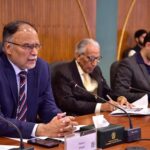ISLAMABAD, Jan 18 (APP): A Memorandum of Understanding (MoU) was inked here on Wednesday on collaboration between Benazir Income Support Programme (BISP) and Massachusetts Institute of Technology (MIT) to strengthen evidence based policy making.
This collaboration for policy relevant research between
internationally renowned social protection experts and BISP would provide insights into BISP policy design and innovative interventions to increase programme graduation rates.
Professor Ben Olken (MIT), Professor Rema Hanna (Harvard
University) and Dr. Adnan Khan (London School Economics) would be
collaborating with BISP.
This collaboration aims to use data analytics to help provide
descriptive insights into the functioning of BISP, develop field evaluations to test BISP policy innovations, knowledge transfers and capacity building through BISP academic collaboration.
It would take innovative BISP lessons to the worldwide
knowledge base in order to help other countries learn from BISP experiences. The researchers will particularly focus on targeting and enrollment of BISP, complementary graduation programs and policy impacts and would assess the impacts of BISP on economic and social outcomes, particularly on child health.
Speaking on the occasion, the Minister of State and
Chairperson BISP MNA Marvi Memon stated that this collaboration
would be valuable as it is very important to base decisions on real evidence in order to best utilize our resources for the benefit of the poor.
She further added that the research would look into the
mechanisms that may help in increased take up of ultra poor in BISP and would delve into effective strategies to encourage graduation from BISP.
This would help in making innovative decisions for graduating
maximum number of beneficiaries from poverty in future. She urged the researchers to also take E commerce in to account while designing poverty exit strategies.
Professor Rema Hanna from Harvard University appreciated BISP
as one of the top social safety nets as more than 119 countries have at least one Unconditional Cash Transfer (UCT) programme.
She stated that collaboration would provide BISP advice on new
National Socio Economic Registry (NSER), conduct analysis of NSER
pilot data, infant mortality, labor supply and education and design field experiments to inform key BISP policy decision points.
Mr. Ali Cheema, member of BISP Board and Program Design
Committee of BISP, who encouraged this collaboration as this would
provide BISP an opportunity to learn from the highest level international experience, was also present.
He stated that BISP is the custodian of a rich data that can
be effectively used for better decision making. There is strong need for BISP to generate its own evidence on the right policies and programs specific to the Pakistani context.
This international collaboration would help BISP in taking
lead in utilization of data in effective policy making.
The future initiatives under BISP should be designed to fine
tune entrepreneurial potential of beneficiaries so they may graduate out of poverty.
APP/muk/rn
22:33/22:40/22:40
20170118 : TAG = DBB : IBD No. = 421
…APP/ National Dar BAT
MoU inked on collaboration between BISP and MIT to strengthen evidence based policy making






